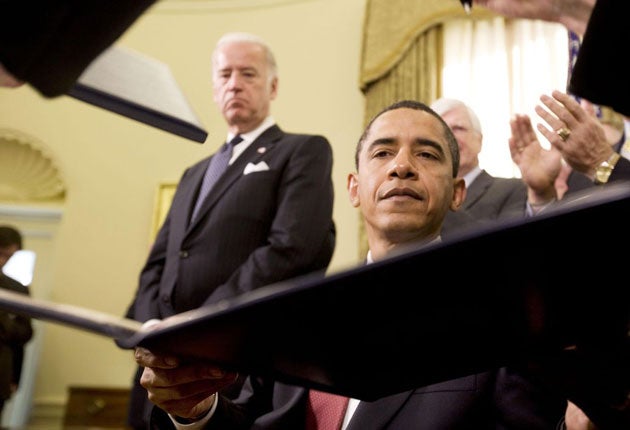Obama may seek public funds for new bank rescue
Democrats preparing ground for new bailout to improve credit flows as administration pledges rapid efforts to rein in excesses on Wall Street

Barack Obama may ask for another multi-billion dollar tranche of taxpayer money to prop up the US banking system, after key lieutenants warned the current $700bn bailout package may not be enough to fix the country's spiralling financial problems.
The new president is already planning sweeping reforms for Wall Street to try to prevent a repeat of the chaos unleashed by the credit crisis, and will make a new push this week to gain momentum for an expanded economic stimulus package, which has run into scepticism from leading Republicans.
But with the words of Mr Obama's sombre and sobering inaugural address still ringing in the public's ears, Democrats have begun to prepare the ground for yet more expensive efforts to restore confidence and fill the financial black hole at the centre of the economy.
Larry Summers, Mr Obama's White House economics supremo, who is giving the president daily economic briefings in the same way he receives a morning intelligence briefing, said the controversial $700bn Wall Street bailout pushed through in October is "a start" that may not be enough to restore the nation's banks to health.
Speaking on NBC's Meet The Press, Mr Summers said: "What ultimately will be necessary is something that will play out over time."
Also yesterday, Nancy Pelosi, speaker of the House of Representatives, said she is open to additional government rescue money for banks and financial institutions, but she is demanding taxpayers get an ownership stake in return.
Congress gave approval earlier this month for the new administration to use the second half of the $700bn fund. The first half was used quickly to plug holes in many of the country's biggest banks, which have been brought to the brink of insolvency by bad bets on risky mortgages. Mr Summers said the administration plans to widen the use of the fund to ensure credit can start flowing again to homebuyers and small businesses but, behind the scenes, there is a battle raging about how far Mr Obama should go towards nationalising the troubled banks. The use of bailout money by former president George Bush has been criticised as ineffective, since the banks have hoarded the cash rather than resumed lending to help the recession-hit economy.
Timothy Geithner, Mr Obama's nomination for Treasury Secretary – whose appointment is being held up on Capitol Hill because of anger that he failed to pay the full amount of taxes owed in a previous job – will announce a new strategy for repairing the banking system after he is confirmed, Mr Summers said. Mr Summers is head of the White House National Economic Council.
Obama aides are also promising quick efforts to regulate Wall Street and rein in the excesses that led to the seizure of the banking system. These will include new rules governing hedge funds and action to prevent unscrupulous lending by mortgage brokers, much of which can be achieved through existing regulators but some of which will also require action by Congress.
Mr Obama prepared the nation in his inaugural address last Tuesday for tough choices and difficult times ahead, and Mr Summers yesterday warned the world's largest economy would get worse before it gets better.
"The next few months are going to be very difficult, no question, and maybe longer than that," he said.
In his weekly radio and YouTube address, Mr Obama set out new details of his proposed $825m economic stimulus plan, which authorises government spending and tax cuts on an unprecedented scale to try to ease the effects of the worst recession since at least the 1980s. Without it, he said, "we could lose a generation of potential, as more young Americans are forced to forgo college dreams or the chance to train for the jobs of the future."
It is far from clear if Mr Obama can hold together his hopes of winning a bipartisan consensus on an economic recovery package. John McCain, his defeated opponent for the presidency, said he could not support the current proposals. And there were a few piquant exchanges in a closed-door meeting with Republican leaders at the weekend, when Mr Obama told them that they "can't just listen to Rush Limbaugh and get things done", referring to the ultra-partisan right-wing talk radio host. In one exchange, with a congressman who took issue with parts of the president's platform, Mr Obama shot back, "I won".
Republicans argue the stimulus bill is being loaded with spending programmes that have little do with helping the economy, and have picked out funding for family planning clinics as one example. Democrats say such measures are designed to ease the financial burden on states.
Joe Biden, the vice-president, said he expected there would be further compromise with Congress, but said the administration is "trying to get money out the door as rapidly as possible". He argued Republican demands for tax cuts would not work quickly enough.
Subscribe to Independent Premium to bookmark this article
Want to bookmark your favourite articles and stories to read or reference later? Start your Independent Premium subscription today.

Join our commenting forum
Join thought-provoking conversations, follow other Independent readers and see their replies